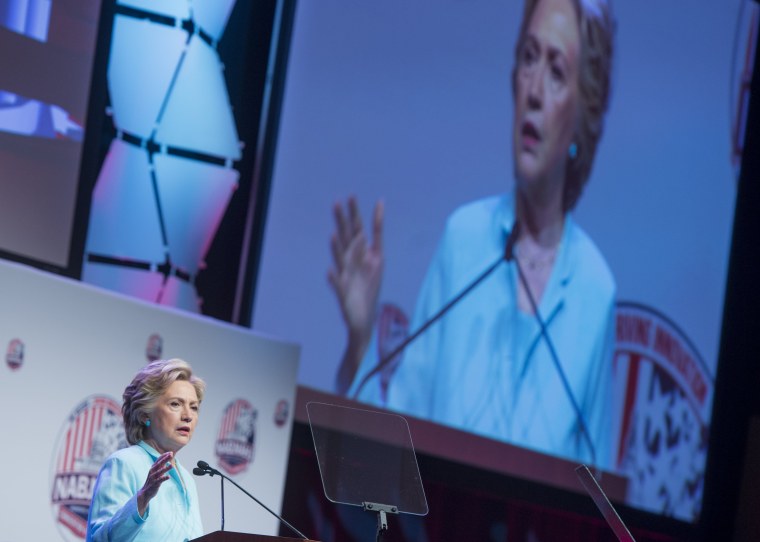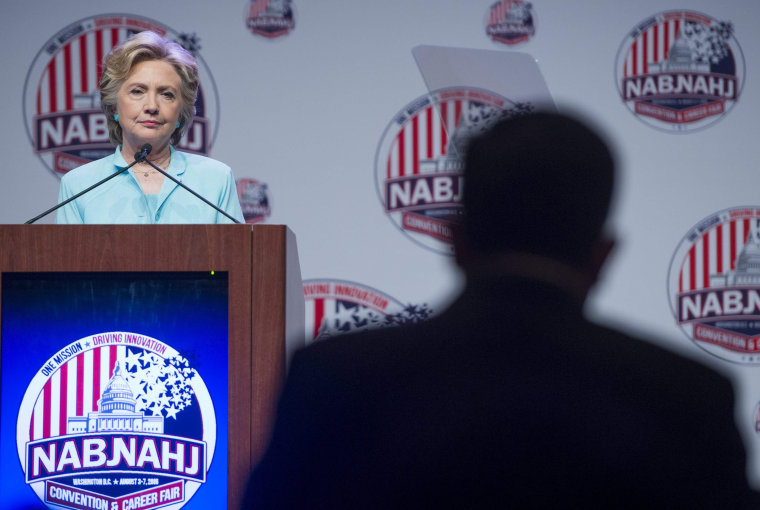Trying to win the first election since President Barack Obama galvanized black and brown voters to put him in office, Democratic nominee Hillary Clinton told the nation's largest gathering of African American and Hispanic journalists she sees a political landscape favorable for immigration reform and promised programs for economic empowerment of minorities.
In a rare news conference, Clinton said a win by her in November would send a clear message to Republicans "that it is time for them to quit standing in the way of immigration reform."
"There's nothing like winning to change minds," she said.
"I see the political landscape as increasingly favorable to making this happen," Clinton said in response to a question from Telemundo's Lori Montenegro, one of two journalists who opened the questions from the rest of the audience.
Clinton urged people to vote not only for president, but also for House and Senate candidates, making clear that minority turnout would make it far easier for her to deliver on immigration and other issues.
Clinton, who has promised to propose an immigration bill within its first 100 days, said she had already spoken to former Senate colleagues who she said had assured her "this will be fast tracked."
Related: Poll: Clinton Performs Well Across Racial and Ethnic Groups
Clinton carried an economic message to the roomful of television, newspaper and online journalists, bloggers and some communicators.
Discussing the profound loss of wealth by blacks (50 percent drop) and Latinos (66 percent), Clinton called raising economic conditions for the groups, "part of the long continuing struggle for civil rights."

She said she would take up a plan pushed by Rep. James Clyburn, D-S.C., that calls for 10 percent of rural development investments to be made in places where at least 20 percent of the population has lived in poverty for 30 years are more. This is a proposal Clyburn had floated as part of the legislation to recover from the Great Recession but was not included in recovery legislation.
Citing the high unemployment rates among black and Latino youths, she reiterated her campaign platform of investing $20 billion to create jobs for young people, pledged to help black and Latino enterprises get access to capital.
"We need to build an economy and future every American can be proud of," she said.
When asked whether her opponent Donald Trump is appealing to racists, Clinton said that "we have to acknowledge" that there is a racist and xenophobic appeal in his message.
But she added, "let’s not lose sight of the real pain that many Americans are feeling because the economy has left them behind."
Her appearance followed a panel of journalists covering the campaign discussing the challenges of covering an election in which racism has shaped the election and the electorate.
While part of the panel focused on Trump denying access to some media organizations at his rallies, the journalists also pointed out that Clinton has not held many news conferences in the election as opposed Trump who regularly does.
Darlene Superville, White House reporter from The Associated Press, said that suggests that press access is likely to be constrained in the next administration.
During panels on immigration earlier in the conference, reporters expressed frustration with the Obama administration's lack of transparency that make obtaining records and information on deportees and about deportations and other immigration matters very difficult.
Clinton was asked how she'll address the fact that many Americans don't trust her.

She said after taking on Obama in the 2008 primary, he surprised her by making her his secretary of state because he trusted her. She finished her time in the U.S. Senate with a 67 percent approval rating, she added.
With so much at stake in what she said is a "crossroads" election, she said people should look at her record including that children and families benefited from a children's health insurance program she worked on, that she went to bat for 9/11 survivors and her work with Republicans to help National Guard members get health insurance they only got when active duty.
"I'm just going to get up every day and make my case," Clinton said, "and I think there will be an opportunity for people to actually hear it."


